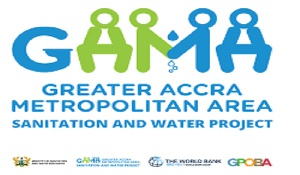 Greater Metropolitan Area-Sanitation and Water Project
Greater Metropolitan Area-Sanitation and Water Project
The Greater Metropolitan Area-Sanitation and Water Project (GAMA-SWP) Media Group has called on the Ministry of Sanitation and Water Resources (MSWR) to adopt effective strategies to confront environmental challenges facing the country.
At a two-day workshop held at Ada in the Dangbe East District Assembly (DEDA) of the Greater Accra Region, they said some of the challenges to be considered include poor development planning of infrastructure and landfills, inadequate funding for logistics, negative public attitudes towards sanitation and ineffective coordination of delivery agencies at the regional and district levels.
They said for Ghana to speed up its rate of progress to meet the Sustainable Development Goals (SDG) Six on water and sanitation for all, there is the need to focus on the promotion of affordable, socially and cultural acceptance technologies.
More so there is the need to practice, improvement of sanitation in all institutions and not only in schools; promote education and organise outreach focused on children, as agents of behavioural change; and “rolling out targeted micro-finance credit scheme for household toilets constructions.”
Others are implementing decentralised treatment and disposal systems incorporating harvesting, re-use of biogas, and that the Ministry and its development partners should work together to mobilise resources for the implementation of environmental sanitation programmes and interventions.
They said these were the only to fully engage communities, stakeholders and government in programmes for effective response to the challenges despite the many interventions over the years.
The aim of the training was to provide journalists with better understanding of issues when it comes to environmental sanitation management on GAMA-SWP programmes.
Mr Anthony Mensah, Director at the Ministry of Sanitation and Water Resource, opening the workshop acknowledged the contribution of the World Bank to enhance environmental sanitation and hygiene in the country.
He said the media serves as intermediaries between projects and stakeholders such as government and communities, hence the need for this workshop.
Mr Mensah said with the various misconceptions on waste management and sanitation it has become critical to use the media to educate, create awareness, sensitise and engage key stakeholders and the communities on GAMA-SWP programmes.
He said the training programme forms part of the MSWR key strategies for 2019, such as more drains, sewerage and to go beyond GAMA-SWP areas of jurisdiction.
Dr Doris Darteh, Board Chairperson of the Graphic Communication Limited, urged journalists to be circumspect in their reportage especially when reporting on sanitation issues.
“You must be cautious of the stories you put on social media on open defecation that turns to hurt the nation and the dignity of the people”. She said.